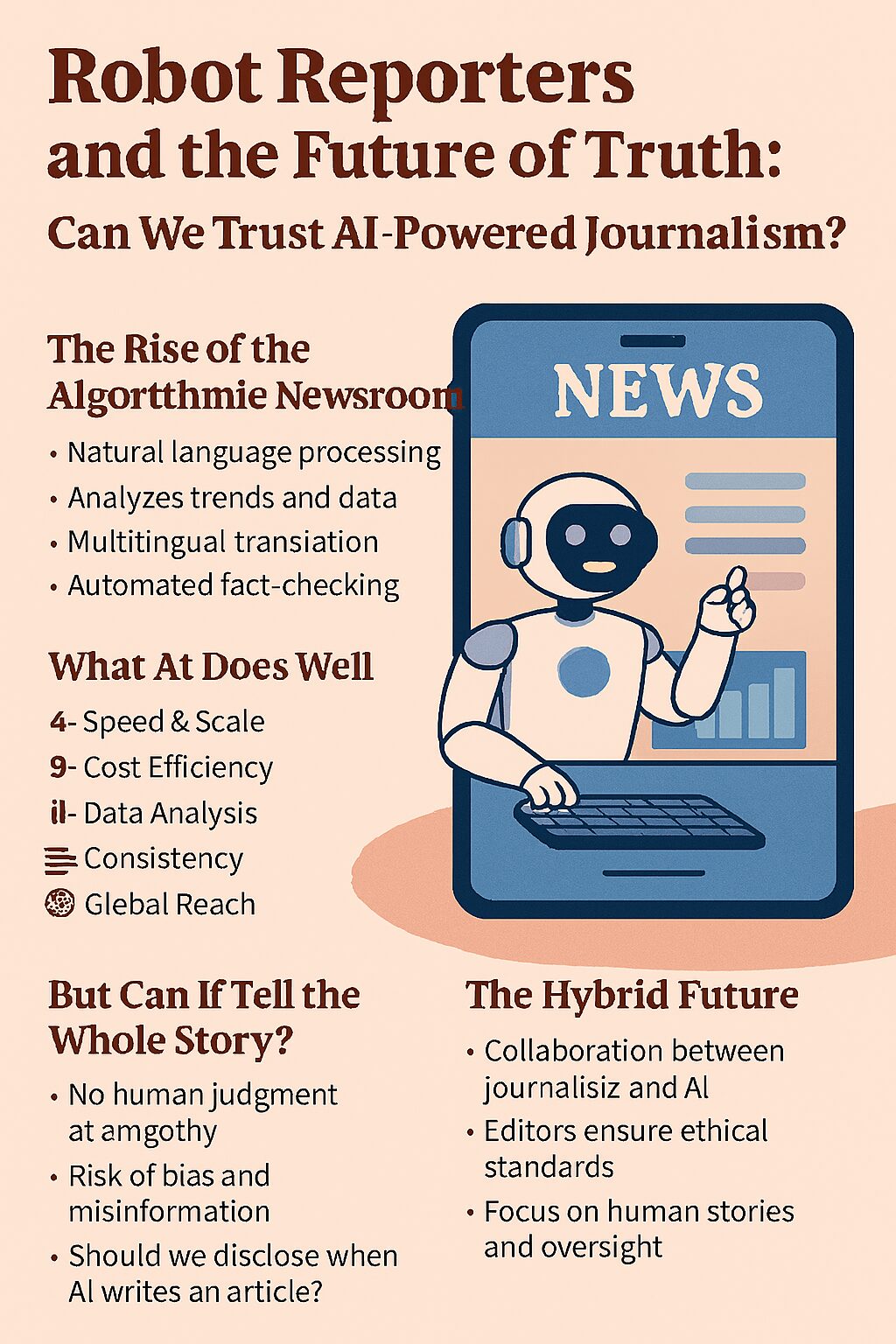Introduction
In 2025, artificial intelligence has become a newsroom regular. From breaking news alerts to financial reports and sports summaries, AI-powered journalism is reshaping how stories are written, published, and consumed. But as algorithms take on more editorial tasks, a critical question emerges: Can we trust robot reporters to deliver truth, nuance, and accountability?
🤖 What Is AI-Powered Journalism?
AI journalism refers to the use of machine learning, natural language processing (NLP), and automated content generation to produce news articles. These systems can:
- Analyze large datasets in seconds
- Generate structured reports (e.g., earnings, weather, sports)
- Summarize breaking news events
- Translate content across languages
- Assist in fact-checking and headline optimization
Major outlets like The Associated Press, Bloomberg, and Reuters already use AI tools to streamline reporting.
📊 Benefits of AI in Newsrooms
| Advantage | Description |
|---|---|
| ⚡ Speed & Efficiency | AI can publish stories in seconds, ideal for real-time updates |
| 💰 Cost Reduction | Reduces editorial overhead for routine reporting |
| 📈 Data-Driven Insights | Analyzes trends across massive datasets |
| 🧮 Error Minimization | Reduces typos and inconsistencies in structured reports |
| 🌍 Multilingual Reach | Translates content for global audiences |
AI excels in producing data-heavy content like financial summaries, election results, and sports scores.
⚠️ Trust Issues: Can AI Be a Journalist?
Despite its strengths, AI journalism raises serious concerns:
- ❌ No Moral Judgment: AI lacks ethical reasoning, crucial in political or social reporting
- ❌ Misinformation Risk: AI relies on existing data—if the source is flawed, so is the story
- ❌ Lack of Accountability: Who is responsible when AI gets it wrong?
- ❌ Opacity: Readers often don’t know if a story was written by a human or a machine
Studies show that while some audiences view AI content as more objective, others find it cold, less trustworthy, and lacking human nuance.
🧑💻 Will AI Replace Human Journalists?
Not entirely. Investigative journalism, opinion pieces, and emotionally resonant storytelling still require human insight. AI is best suited for:
- Routine reporting
- Data analysis
- Content summarization
- Editorial assistance
The future points to a hybrid model, where journalists use AI to enhance productivity—not replace creativity.
🌍 Global Adoption & Regulation
- The Guardian uses AI only with editorial oversight and senior approval
- UNESCO calls for transparency and ethical standards in AI-generated content
- EU regulators are exploring guidelines to prevent bias and misinformation in automated journalism
Public trust hinges on disclosure, editorial control, and algorithmic transparency.
🔍 SEO Tips for Media Tech Writers
✅ High-Impact Keywords
- “AI-powered journalism 2025”
- “robot reporters in newsrooms”
- “automated news generation”
- “trust in AI journalism”
✅ Metadata Optimization
- Meta Title: “AI-Powered Journalism: Can We Trust Robot Reporters?”
- Meta Description: “Explore how AI is transforming newsrooms and whether robot reporters can be trusted to deliver accurate, ethical journalism.”
✅ Structured Formatting
- Use headings, tables, and bullet points for readability
- Include alt text for visuals (e.g., “AI writing a news article on a digital dashboard”)
Conclusion
AI-powered journalism is here—and it’s changing everything. While algorithms offer speed and scale, they lack the soul of storytelling. The challenge ahead isn’t just technical—it’s ethical.
Can we trust robot reporters? Only if we build systems that prioritize truth, transparency, and human oversight.

